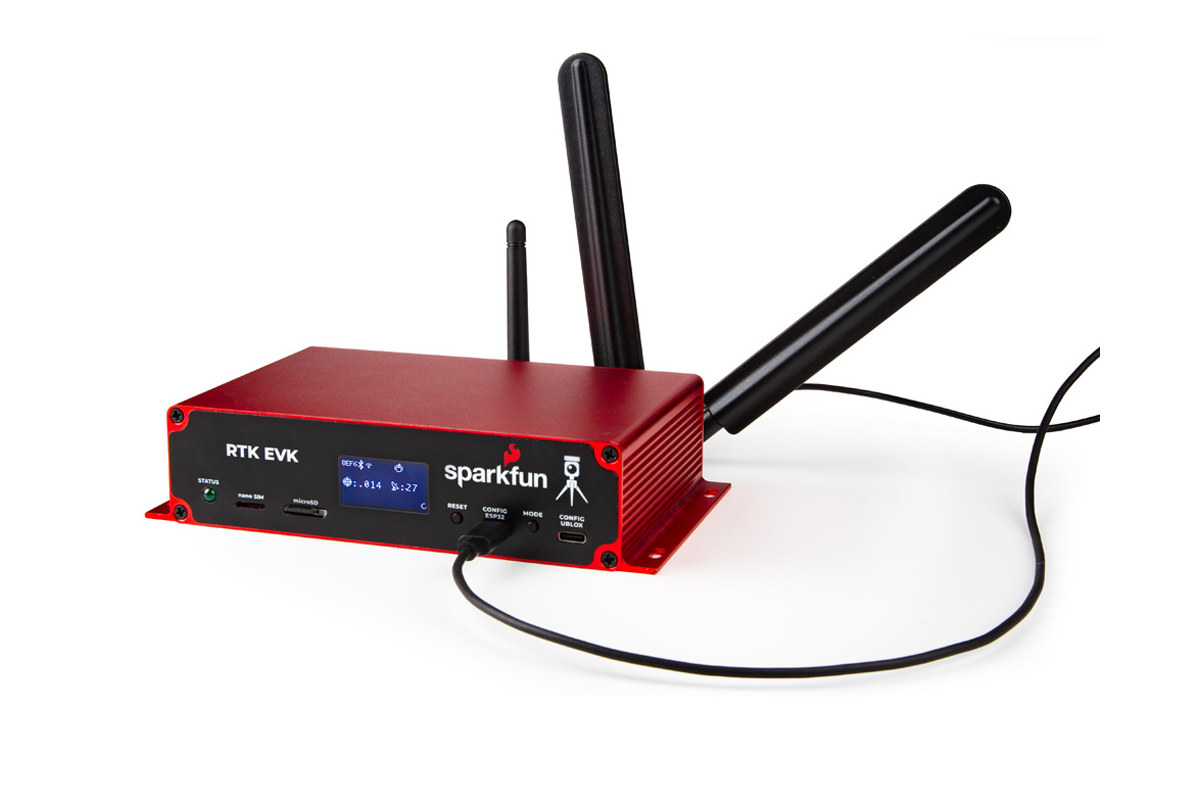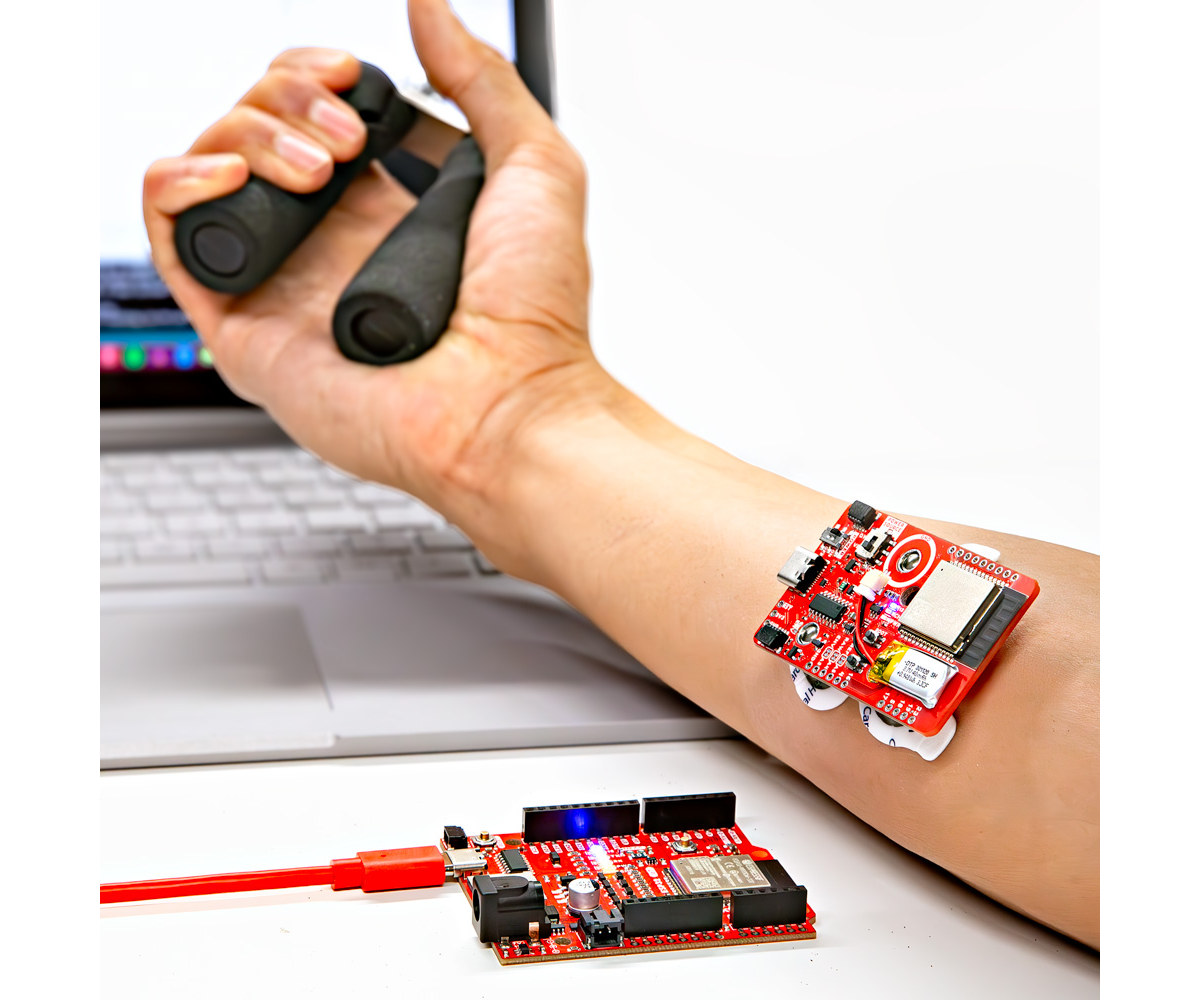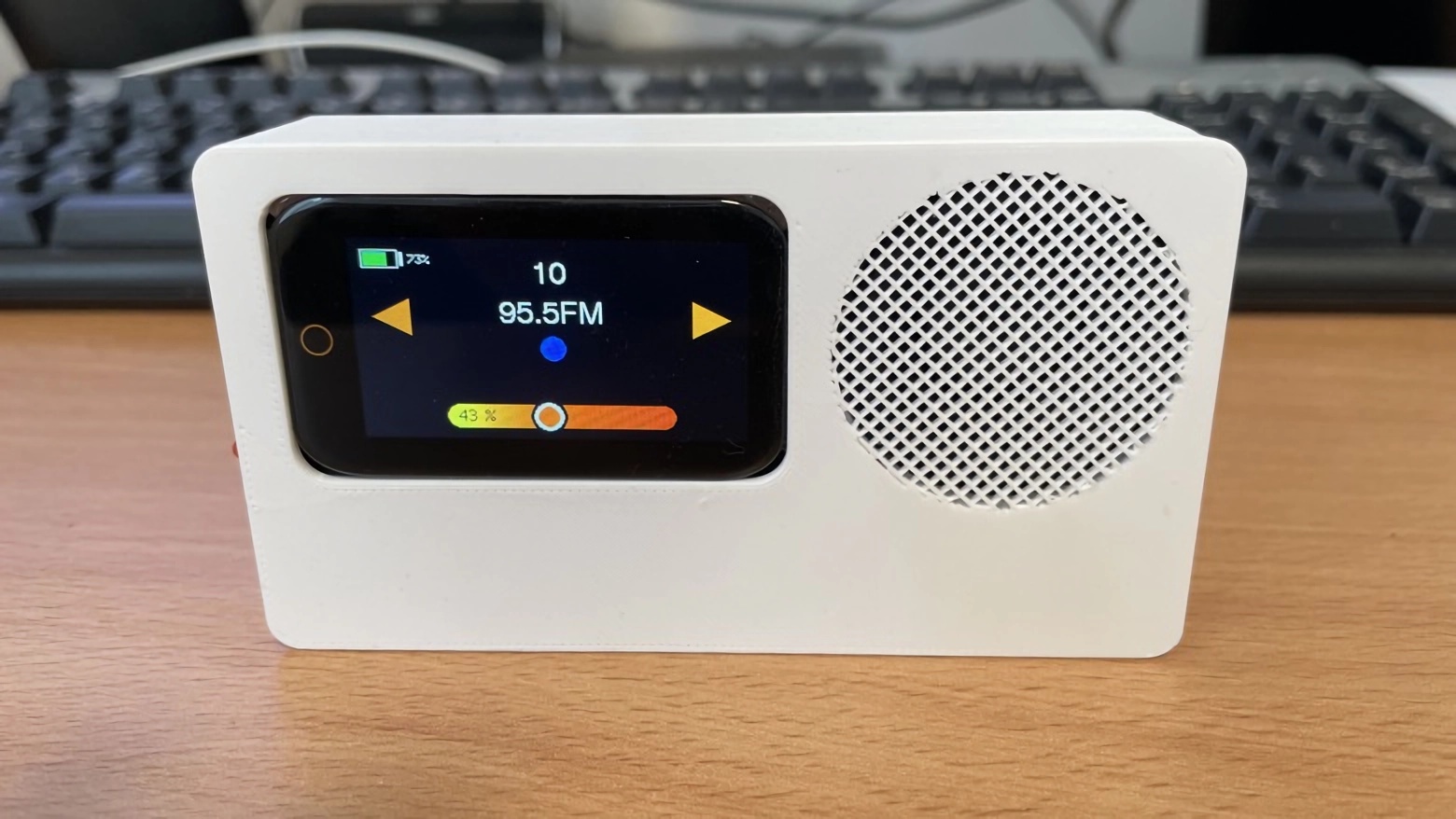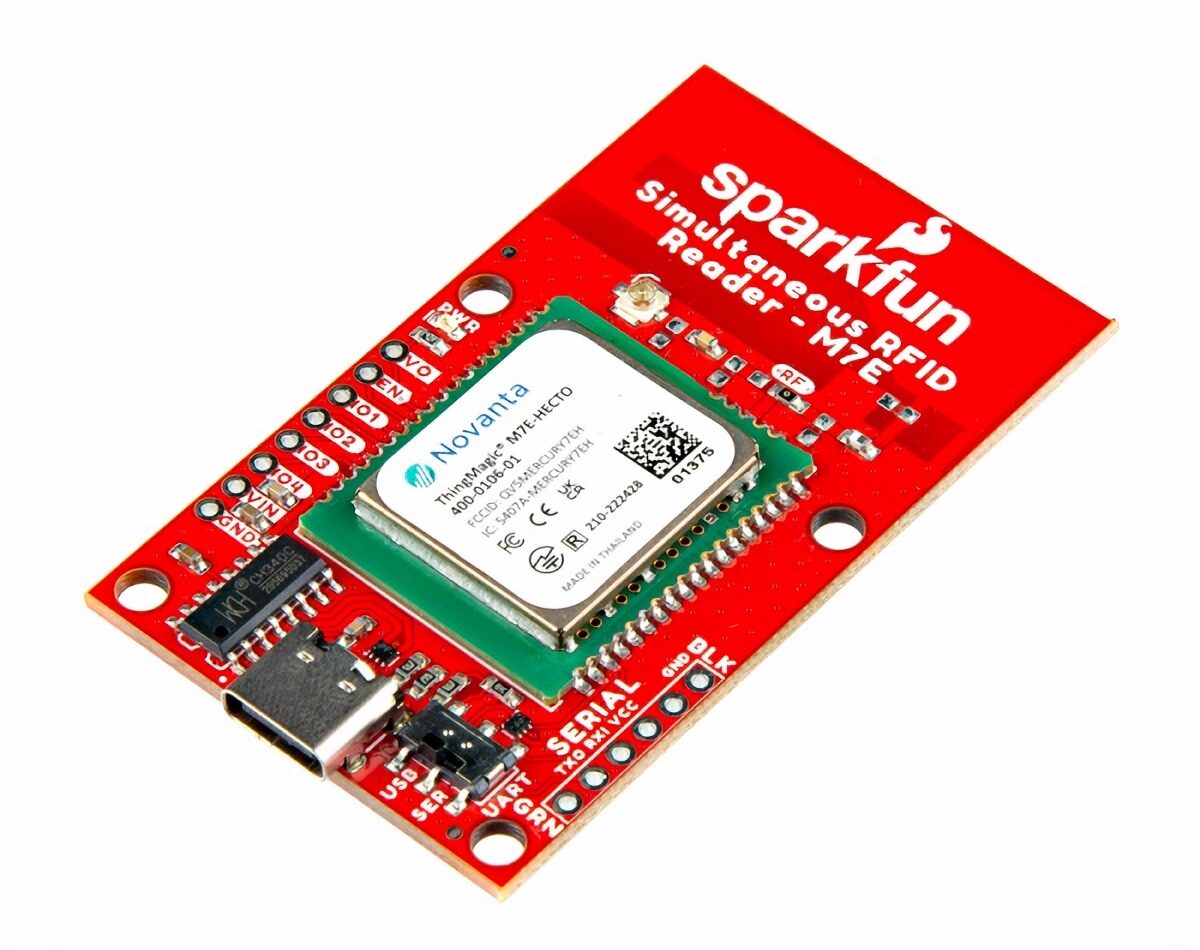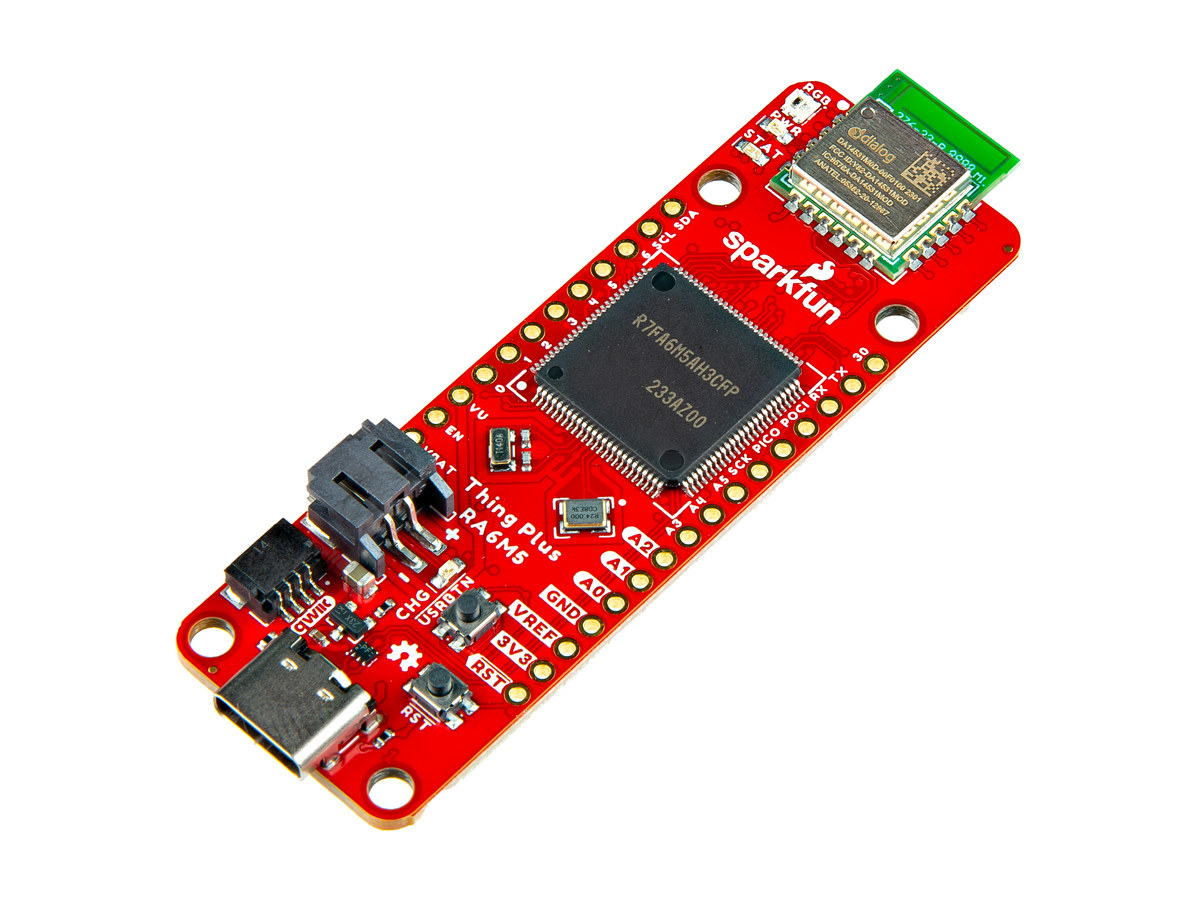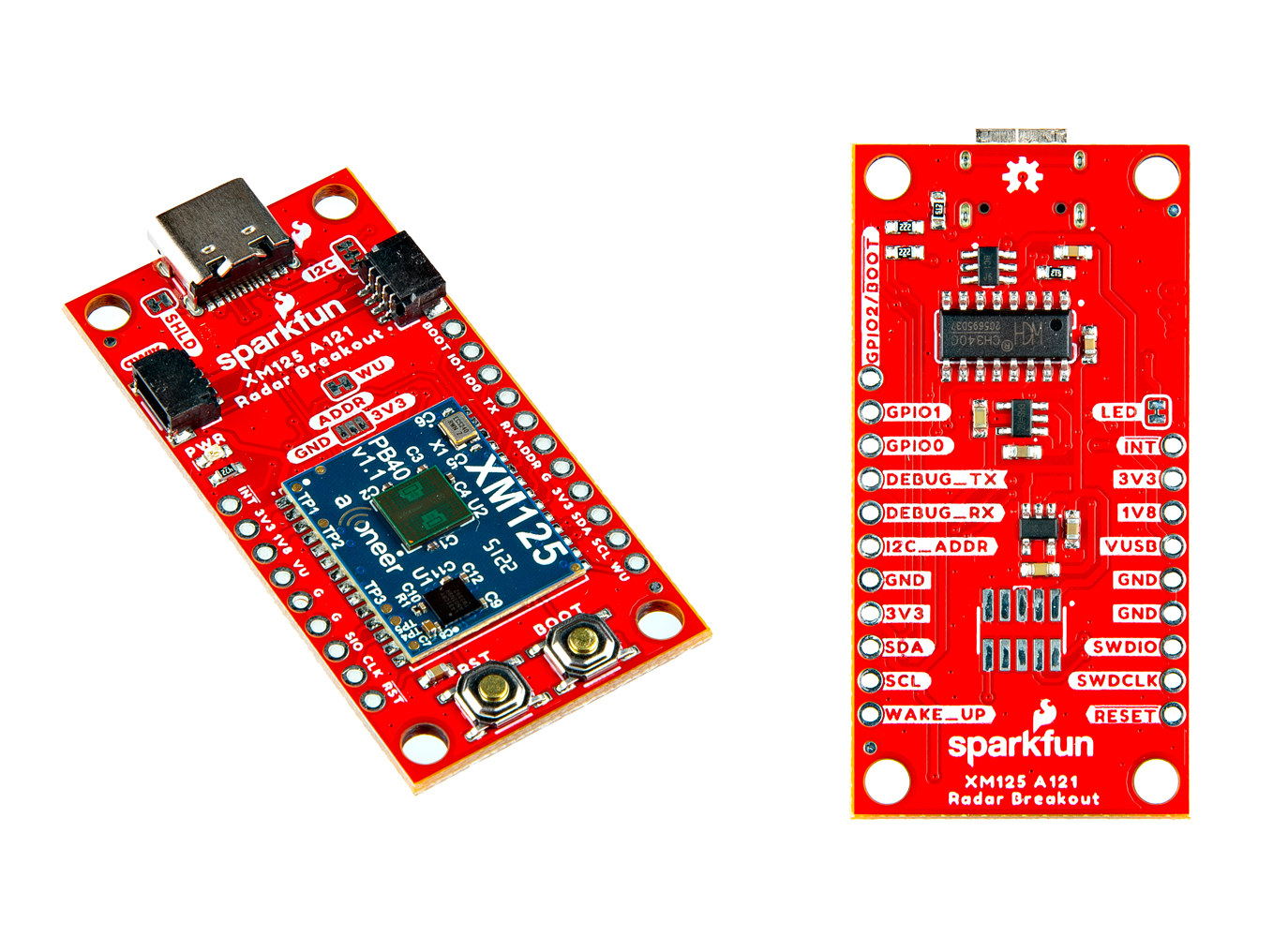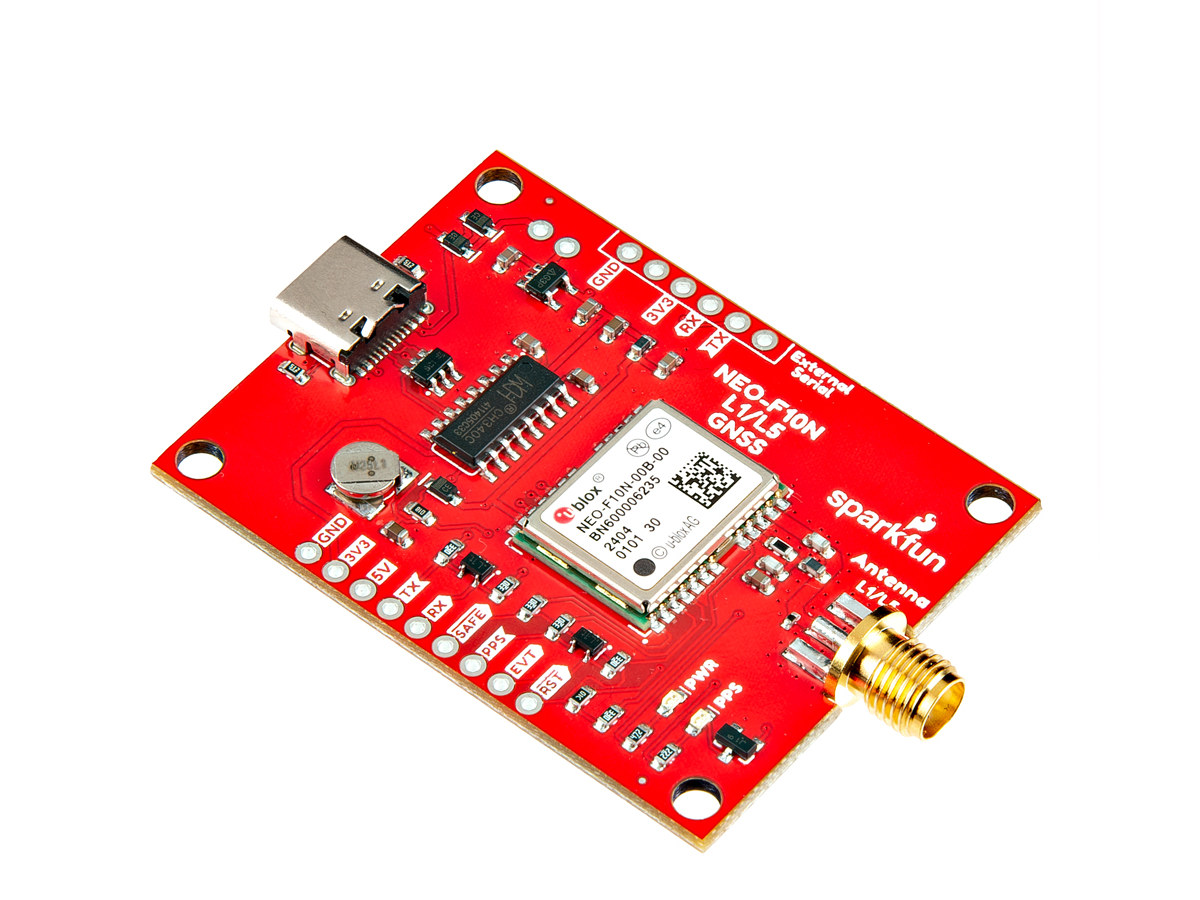SparkFun Thing Plus – NORA-W306, is a dual-core, dual-band WiFi 4 and BLE 5.3 microcontroller board in the AdaFruit Feather form factor based on the u-box NORA-W306 module and targeted at low-power wireless applications. The u-blox module integrates the Realtek RTL8720DF chip, a dual-core ARM Cortex-M33 and Cortex-M23 microcontroller with dual-band Wi-Fi (2.4GHz and 5GHz) and Bluetooth 5.3 Low Energy. It offers up to 4MB of encrypted flash and has an onboard PCB antenna. It’s very similar to the RealTek RTL8720DN we covered a few times in the past, but comes with embedded flash. The SparkFun Thing Plus – NORA-W306 board features a USB-C connector for programming, data, and power. The USB data lines are protected against electrostatic discharge and are connected to a CP2102N USB-to-serial converter for uploading code or serial. This board includes a 2-pin JST-style connector for a LiPo battery, a single-cell charger, and a LiPo fuel […]
SparkFun RTK EVK offers GNSS with centimeter accuracy, WiFi, Bluetooth, 4G LTE Cat 1, and Ethernet connectivity
SparkFun RTK EVK is a fully-enclosed GNSS platform designed for fixed or mobile high-precision positioning and navigation applications with centimeter accuracy thanks to RTK (real-time kinematic) technology implemented with modules from u-blox. About two months ago, Sparkfun introduced the RTK Torch waterproof GNSS surveyor with Unicore UM980 GNSS module with RTK support, ESP32 for WiFi/Bluetooth, and an STM32WLE5C LoRa SoC. The SparkFun RTK EVK (evaluation kit) may drop LoRa connectivity, but it’s a more versatile platform with WiFi, Bluetooth, Ethernet, and LTE Cat 1 cellular connectivity, besides support for L1 + L2 RTK GNSS with L-Band correction. Sparkfun RTK EVK specifications: GNSS Receiver – u-blox ZED-F9P Concurrent reception of GPS, GLONASS, Galileo, and BeiDou Receives both L1C/A and L2C bands 184-channel u-blox F9 engine Time to First Fix: 25s (cold), 2s (hot) Max Navigation Rate: 20Hz / 25Hz depending on mode Horizontal Position Accuracy: 2.5m without RTK; 0.010m with RTK […]
MyoWare 2.0 Muscle Sensor Wireless Kit targets electromyography (EMG) applications
The MyoWare 2.0 Muscle Sensor Wireless Kit is an Arduino-compatible electromyography (EMG) sensor kit capable of detecting and measuring the electrical signals generated by muscle fibers in the body. The MyoWare 2.0 kit is a collaborative product by SparkFun and Advancer Technologies. The MyoWare 2.0 ecosystem brings several improvements over the previous generation, including a compact design, solderless snap connectors, and an upgraded chipset for improved reliability and performance. It includes shields designed to seamlessly interface with the MyoWare 2.0 Muscle sensor, a wearable, Arduino-compatible EMG sensor. The Muscle Sensor’s wearable design makes it possible to directly attach biomedical sensor pads and add-on shields to the board. It operates on a single-supply voltage between +3.3V to +5V and supports three separate output modes. It analyzes filtered and rectified activity from muscle movement and outputs a signal from 0 to the power source voltage (VIN) that represents the intensity of flex. […]
ESP32-S3-based kit allows you to build an Internet Radio with a touchscreen display
The ESP32 Internet Radio from Poland-based maker, The MicroMaker, is a simple hardware kit that combines the LilyGo T-Display S3 Development board with an I2S audio breakout module and other components to form a radio that can access and stream from online radio stations. With the ESP32 Internet Radio, you are not limited to the radio stations available in your immediate vicinity. It is powered by the LilyGo T-Display S3 which integrates the network-capable ESP32-S3 microcontroller (Wi-Fi + BLE 5), a 1.9” full-color capacitive touchscreen display, and two programmable buttons. The ESP32-S3’s integrated Wi-Fi capability allows the radio to connect to the Internet, and the touchscreen brings an intuitive and easy-to-use interface to the device. It supports up to 512 stored radio stations, and you can manage these stations from a web browser on your PC or mobile phone. The Internet Radio can be powered by an 18650 Lithium-ion battery […]
SparkFun M7E Hecto is a simultaneous RFID Reader with USB-C connectivity and a range of up to 5m
SparkFun has announced the M7E Hecto, a ‘simultaneous’ RFID reader in a compact form factor and high-performance capabilities. The RFID reader is powered by Jadak’s Hecto module (M7E-HECTO) from the ThingMagic series which offers a wide RF output range from 0 dBm to +27 dBm and reads up to 300 tags/second. SparkFun M7E Hecto builds on the much older M6E Nano RFID reader, adding a USB-C port, increasing the read rate from 150 tags/second, and reducing power consumption. It supports an external antenna (sold separately) which extends the scanning distance up to 16 ft (4.8m) from the 1 to 2 ft (0.3m – 0.6m) range supported by the onboard antenna. It does come with a warning to ensure that personnel are not directly in the radiation beam of the antenna while they are within 21cm of the antenna (to adhere to FCC limits for long-term exposure to RF emissions). The […]
SparkFun Thing Plus – RA6M5 board supports Bluetooth 5.1 LE through Renesas DA14531MOD module
SparkFun Thing Plus – RA6M5 is a small MCU board based on a 200 MHz Renesas RA6M5 Cortex-M33 microcontroller and a Renesas DA14531MOD Bluetooth 5.1 LE module that follows Adafruit Feather/Sparkfun Thing Plus form factor. The module can transmit data over BLE with just 4mA (at 3.3V) power consumption and the company claims the board to be powered by a coin-cell battery. A LiPo battery can also be connected to the board through a 2-pin JST battery connector, and the Things Plus – RA6M5 board also features a single-cell charger and LiPo fuel gauge. Sparkfun Thing Plus – RA6M5 specifications: Microcontroller – Renesas R7FA6M5AH3CFP Core – Arm Cortex-M33 microcontroller @ up to 200 MHz Memory – 512KB SRAM Storage – 2MB Flash Security – Arm TrustZone, and Secure Crypto Engine 9 Wireless – Renesas DA14531MOD module for Bluetooth 5.1 LE connectivity with support for CodeLess AT command Datapump Radio Transmit […]
Sparkfun’s Pulsed Coherent Radar Sensor features Acconeer XM125 60 GHz module, works through walls, offers up to 20-meter range
SparkFun has launched a new Qwiic breakout board for the Acconeer XM125 60 GHz pulsed coherent radar sensor that can measure distance to humans even through walls and works at a distance of up to 20 meters. We’ve seen tiny 24GHz or 60GHz radar modules for several years now, and Supachai even reviewed the Seeed Studio mmWave sensor using ESPHome and Home Assistant late last year with the solution relying on Frequency-Modulated Continuous Wave (FMCW) technology. The Acconneer XM125 is a Pulse-radar module that emits electromagnetic waves in short bursts instead of continuously like FMCW radars and allows longer measurement ranges potentially at the cost of lower accuracy. Sparkfun Pulse Coherent Radar Sensor specifications: Acconeer XM125 Module A121 60GHz Pulsed Coherent Radar (PCR) Integrated baseband, RF front-end, and antenna in package Detects distance, speed, motion, and objects up to 20 meters away Millimeter precise readings Low power consumption STMicro STM32L431CBY6 […]
SparkFun’s latest GNSS breakout board features u-Blox NEO-F10N L1/L5 dual-band receiver for urban environments
The SparkFun GNSS L1/L5 Breakout is a standard precision GNSS board with meter-level positional accuracy that features the u-Blox NEO-F10N dual-band module, an SMA antenna connector, and a USB-C port for power and data. As its name implies, the board relies on the L1/L5 bands of the NEO-F10N instead of the more commonly seen L1/L2 bands and delivers better performance in urban environments. That’s because the L5 band falls within the protected ARNS (aeronautical radionavigation service) frequency band leading to less RF interference. SparkFun GNSS L1/L5 Breakout specifications: GNSS u-Blox NEO-F10N module with L1/L5 dual-band GNSS receiver Concurrent Reception of GPS, Galileo, and Beidou Integrated SMA Connector Time to First Fix: 28s (cold), 2s (hot) Max Navigation Rate for Single GNSS Configuration (GPS): 20 Hz Positional Accuracy (GPS) – 1.5m Time Pulse Accuracy – 30ns Operational Limits Max G: ≤ 4G Max Altitude: 80km Max Velocity: 500m/s Supports NMEA, UBX […]



